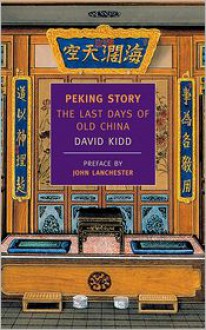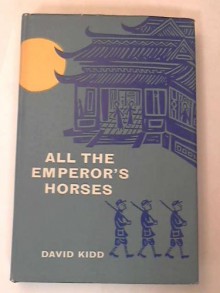Dear David Bowie fans, yes indeed, these two titles are the same book. So if you're having trouble finding All The Emperor's Horses, try looking for Peking Story: The Last Days of Old China.
I loved this book! It's the true story of a very young American man living in China who marries into an aristocratic Chinese family shortly after the Maoist revolution. For generations the Yu family has been living a life of elegance and splendor in their mansion which is crammed with antiques and gardens. But the writing is on the wall that their customs, their money, and their ancestral home are all coming to the end. As an outsider/insider, David Kidd poignantly shows the end of a very long era. There were many funny and sad incidents, each so strange they could never have been imagined.
I'll give you one highlight from the book that takes place in the very beginning and is not very spoiler-y: David and his bride Aimee were eager to marry immediately, because her father was dying and after his death mourning custom would make them wait for a year. But the American consulate recognized neither Chinese civil marriages nor marriage ceremonies of any religion other than Christianity. However no Christian church in China was willing to sanction an interracial wedding. Not to mention that the bride's family only wanted a Chinese wedding. Luckily, the janitor at the consulate had a brother who was a Chinese Christian minister. Not only that, the minister could even say one sentence in English ("I am Reverend Joseph Feng.") Saved! One of David's friends who was present at their wedding was William Empson, the English poet and critic.
One thing that I really liked about this book was that it was NOT racist, which is what I would have expected from a 1960 memoir about 1940's China. I got a faint sense that David Kidd thought he was better than everyone else, but there are many possible reasons for that. To the extent that the story was about him and not what he observed going on around him, it was actually the story of an arrogant person who is humbled and changed. The edition I read had a preface by John Lanchester, which I thought was very appropriate because David Kidd reminded me of the protagonist of Lanchester's The Debt to Pleasure--cultured, wry, more interested in beauty than a typical person is--not unhinged or murderous, though.
Since I first heard about this memoir through David Bowie's top 100 books list, I have to mention the most Bowie-esque part. At a party, one guest was "attired as a Mongolian princess, complete with oiled black hair encrusted with coral and turquoise, an arranged over a frame of what looked like horns." An English guest exclaims over the costume, and David Kidd informs him that it's no costume, she really is a Mongolian princess. Intrigued, the English guest asks the princess for a dance. "I hadn't the heart to tell him that the Mongolian princess was really a Mongolian prince."


 Log in with Facebook
Log in with Facebook 







